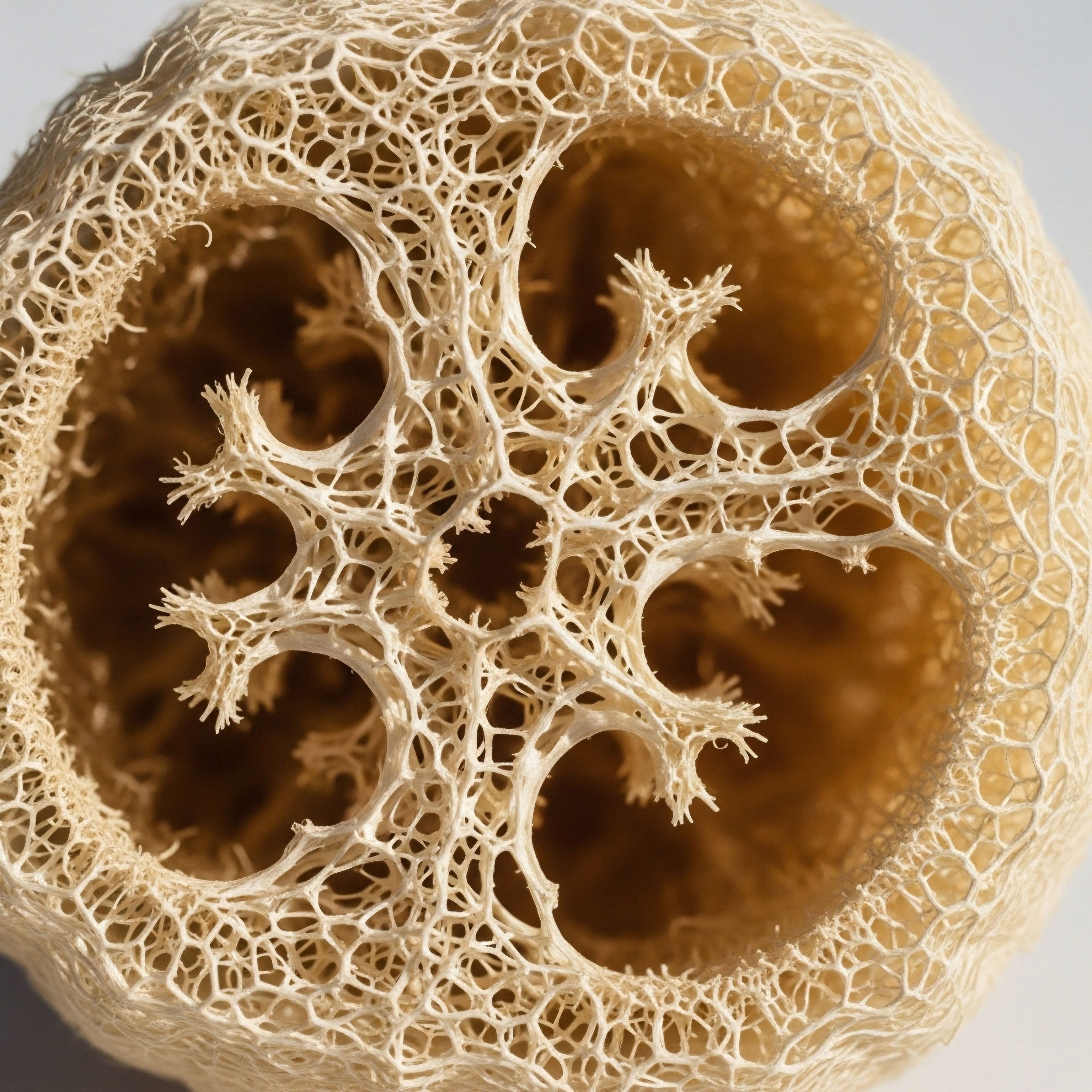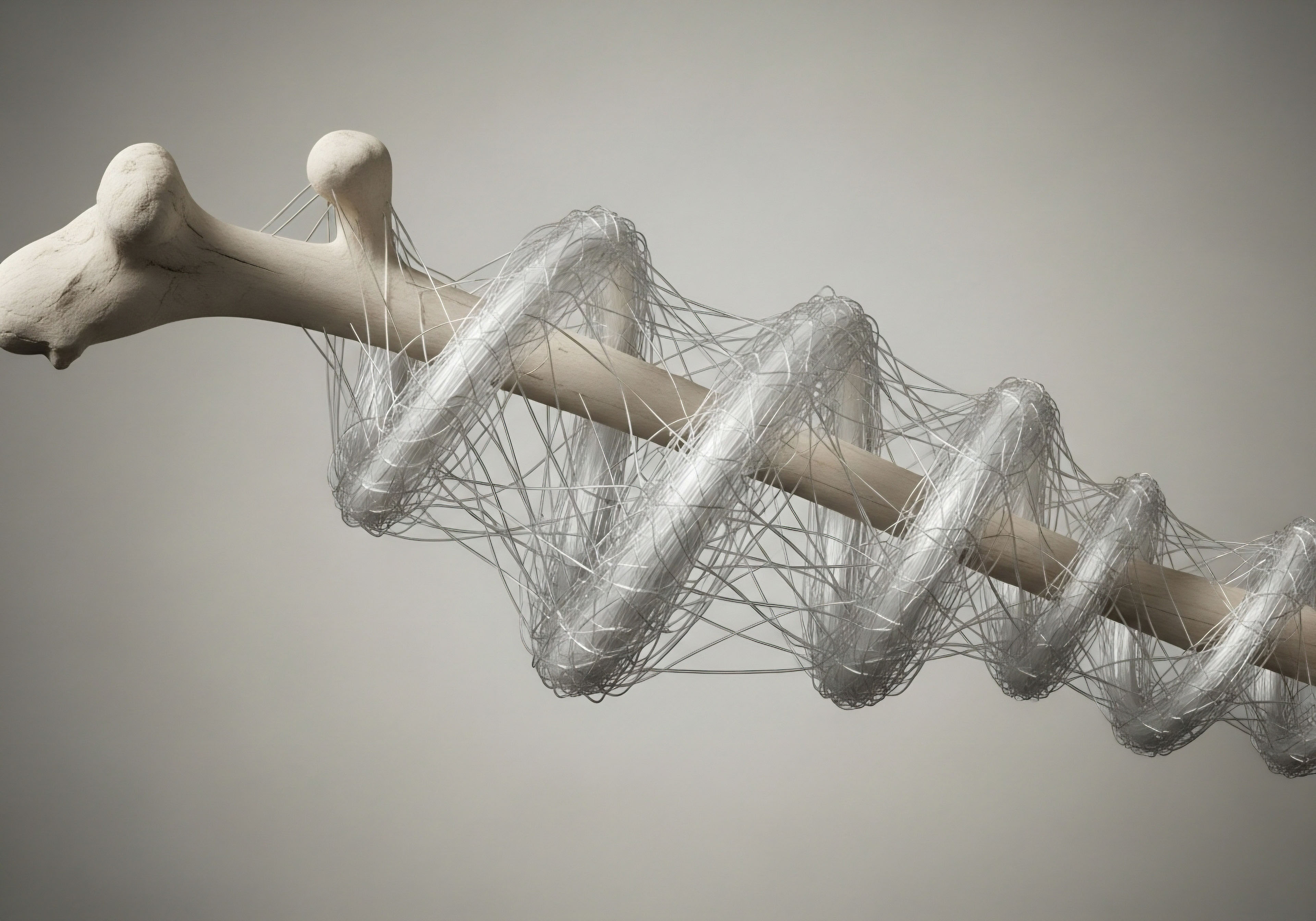

Fundamentals
The experience of watching your own cognitive sharpness seemingly dim over time can be a profoundly disquieting process. You might notice it in small ways at first, a name that sits on the tip of your tongue, a misplaced set of keys, or a general feeling of mental fog that you cannot seem to shake.
This lived reality, this subjective sense of a decline in mental acuity, is a valid and important starting point for a deeper conversation about your body’s intricate internal communication network. Your brain does not operate in isolation. It is in constant dialogue with the rest of your body through a sophisticated system of chemical messengers, and a key part of that conversation involves the hormone testosterone.
Testosterone is a primary androgenic hormone, and while it is often associated with male physiology, it is a vital component of health for both men and women. In men, it is produced primarily in the testes, and in women, it is produced in smaller amounts by the ovaries and adrenal glands.
Its role extends far beyond sexual function. This hormone is a key regulator of energy levels, mood, bone density, and muscle mass. When we consider its influence on the brain, we are looking at a molecule that helps to shape our cognitive landscape. It interacts with receptors throughout the brain, influencing neurotransmitter systems and cellular processes that are fundamental to how we think, learn, and remember.
Understanding the connection between testosterone and cognitive function begins with recognizing the hormone’s role as a key regulator of the brain’s internal environment.
A decline in testosterone levels, a natural part of the aging process for both men and women, can therefore manifest as a change in cognitive function. For men, this decline is often gradual, a condition sometimes referred to as andropause. For women, the hormonal fluctuations of perimenopause and menopause can also lead to a significant drop in testosterone.
The symptoms that accompany this decline are not just physical. They can include a diminished sense of well-being, fatigue, and that frustrating sense of cognitive slowing. The question then becomes, if declining testosterone is contributing to these cognitive changes, could restoring it to optimal levels offer a way to reclaim some of that lost mental clarity?
The potential for testosterone therapy to offer cognitive benefits is an area of active scientific inquiry. The evidence suggests that restoring testosterone to a healthy physiological range may indeed have a positive impact on certain aspects of cognition. Studies have explored its effects on a range of mental skills, from verbal memory to spatial reasoning and executive function.
The goal of such therapy is to recalibrate the body’s hormonal environment, to bring a key system back into balance, and in doing so, to support the optimal functioning of the brain. This is a journey of understanding your own biology, of connecting the subjective experience of cognitive change to the objective reality of your body’s internal chemistry.


Intermediate
Exploring the clinical application of testosterone therapy for cognitive enhancement requires a move from foundational concepts to the specifics of treatment protocols and the evidence that supports them. The scientific literature on this topic presents a complex picture, with studies yielding a range of outcomes.
This variability is a direct reflection of the intricate nature of the relationship between hormones and cognition. The effectiveness of testosterone supplementation is influenced by a multitude of factors, including the individual’s baseline hormonal status, the specific cognitive domains being assessed, and the design of the clinical trials themselves.

How Does Testosterone Therapy Influence Cognitive Processes?
The proposed mechanisms by which testosterone may exert its cognitive effects are multifaceted. One key area of investigation is its role in neuroprotection. Testosterone has been shown to have a protective effect on neurons, potentially shielding them from age-related damage and degeneration.
It may also influence the production and regulation of neurotransmitters, the chemical messengers that facilitate communication between brain cells. Furthermore, testosterone can impact cerebral blood flow, ensuring that the brain receives the oxygen and nutrients it needs to function optimally.
The cognitive domains that appear to be most responsive to testosterone therapy include verbal learning and memory, visuospatial skills, and executive function. For example, some studies have shown that postmenopausal women treated with testosterone demonstrated notable improvements in their ability to learn and recall new verbal information.
The clinical application of testosterone therapy for cognitive benefits is a nuanced field, with outcomes dependent on a variety of individual and methodological factors.
The protocols for testosterone replacement therapy are carefully tailored to the individual, taking into account their sex, age, symptoms, and laboratory findings. For men experiencing the symptoms of low testosterone, a typical protocol might involve weekly intramuscular injections of testosterone cypionate.
This is often complemented by other medications, such as gonadorelin, to help maintain the body’s own natural testosterone production, and anastrozole, to manage the conversion of testosterone to estrogen. For women, the approach is different, with much lower doses of testosterone being used. A common protocol for women involves weekly subcutaneous injections of a low dose of testosterone cypionate, sometimes in combination with progesterone, depending on their menopausal status.

Comparing Testosterone Therapy Protocols for Men and Women
The following table provides a simplified comparison of typical testosterone therapy protocols for men and women, highlighting the key differences in approach.
| Protocol Component | Typical Protocol for Men | Typical Protocol for Women |
|---|---|---|
| Testosterone Formulation | Testosterone Cypionate (intramuscular) | Testosterone Cypionate (subcutaneous) or Pellet Therapy |
| Dosage | Higher dosage, typically weekly | Lower dosage, typically weekly |
| Adjunctive Medications | Gonadorelin, Anastrozole, Enclomiphene | Progesterone (depending on menopausal status), Anastrozole (with pellet therapy) |
Lifestyle factors also play a significant role in modulating the cognitive effects of testosterone therapy. Regular physical exercise, a nutrient-dense diet, adequate sleep, and stress management techniques can all contribute to a more favorable hormonal environment and enhance the brain’s receptivity to the benefits of testosterone.
For instance, resistance training has been shown to naturally boost testosterone levels, while chronic stress can have the opposite effect. A holistic approach that combines targeted hormonal support with a healthy lifestyle is therefore essential for achieving the best possible cognitive outcomes.
- Exercise ∞ Regular physical activity, especially resistance training, can help to optimize testosterone levels and improve cognitive function.
- Nutrition ∞ A diet rich in healthy fats, proteins, and micronutrients provides the building blocks for hormone production and brain health.
- Sleep ∞ Adequate, high-quality sleep is essential for hormonal regulation and cognitive restoration.
- Stress Management ∞ Chronic stress can disrupt the endocrine system and negate the benefits of testosterone therapy.


Academic
A deeper, academic exploration of the cognitive benefits of testosterone therapy requires a shift in perspective from the clinical to the molecular. The brain is a profoundly complex, dynamic system, and testosterone’s influence upon it is not a simple, linear process.
Instead, it is a cascade of interactions that occur at the cellular and subcellular levels, modulating gene expression, synaptic plasticity, and neuronal survival. To truly understand the potential for cognitive enhancement through testosterone, we must examine the intricate interplay between the endocrine and nervous systems, with a particular focus on the neuroprotective and neurotrophic properties of this versatile hormone.

What Are the Neurobiological Mechanisms Underpinning Testosterone’s Cognitive Effects?
At the heart of testosterone’s cognitive influence lies its ability to interact with androgen receptors, which are widely distributed throughout the brain, including in areas critical for learning and memory such as the hippocampus and amygdala. Upon binding to these receptors, testosterone can initiate a signaling cascade that alters the expression of specific genes, leading to changes in protein synthesis and cellular function.
One of the most significant consequences of this process is the modulation of synaptic plasticity, the ability of synapses to strengthen or weaken over time, which is the cellular basis of learning and memory. Testosterone has been shown to enhance long-term potentiation, a key mechanism of synaptic plasticity, in the hippocampus.
The cognitive benefits of testosterone therapy are rooted in its complex and multifaceted actions at the molecular and cellular levels within the brain.
Beyond its effects on synaptic plasticity, testosterone also exhibits potent neuroprotective properties. It has been shown to protect neurons from a variety of insults, including oxidative stress, excitotoxicity, and apoptosis (programmed cell death). This neuroprotective effect is thought to be mediated, in part, by its ability to upregulate the expression of anti-apoptotic proteins and to reduce the production of pro-inflammatory cytokines.
Furthermore, testosterone can be aromatized to estradiol within the brain, and this locally produced estrogen also has significant neuroprotective effects. This conversion of testosterone to estradiol is a key aspect of its action in the brain, and it highlights the complex interplay between different hormonal pathways.

Testosterone and Its Relationship to Neurodegenerative Disease
The neuroprotective properties of testosterone have led to considerable interest in its potential role in the prevention and treatment of neurodegenerative diseases, particularly Alzheimer’s disease. Observational studies have shown that men with higher levels of free testosterone have a lower risk of developing Alzheimer’s disease. The proposed mechanisms for this protective effect are numerous.
Testosterone has been shown to reduce the production and accumulation of beta-amyloid peptide, the main component of the amyloid plaques that are a hallmark of Alzheimer’s disease. It may also help to maintain the integrity of the blood-brain barrier, preventing the entry of harmful substances into the brain. The following table summarizes some of the key research findings on the relationship between testosterone and Alzheimer’s disease.
| Research Finding | Implication for Alzheimer’s Disease |
|---|---|
| Reduced Beta-Amyloid Production | May slow the formation of amyloid plaques. |
| Enhanced Synaptic Plasticity | May help to preserve cognitive function in the face of neurodegeneration. |
| Neuroprotective Effects | May protect neurons from damage and death. |
| Anti-inflammatory Actions | May reduce the chronic inflammation that is a feature of Alzheimer’s disease. |
It is important to note that while the preclinical and observational data are promising, the results from clinical trials of testosterone therapy for cognitive impairment in older adults have been mixed. This underscores the complexity of the issue and the need for further research.
Future studies will need to be larger, of longer duration, and will need to use more standardized methods for assessing both hormonal status and cognitive function. A deeper understanding of the molecular mechanisms of testosterone’s action in the brain will be essential for developing more targeted and effective therapeutic strategies for cognitive enhancement.
- The Hypothalamic-Pituitary-Gonadal (HPG) Axis ∞ The regulation of testosterone production is controlled by a complex feedback loop involving the hypothalamus, the pituitary gland, and the gonads. Understanding this axis is fundamental to understanding the effects of testosterone therapy.
- Aromatization ∞ The conversion of testosterone to estradiol in the brain is a key process that contributes to its neuroprotective and cognitive-enhancing effects.
- Androgen Receptor Density ∞ The density and distribution of androgen receptors in the brain can vary between individuals and can influence the response to testosterone therapy.

References
- Behre, H. M. & Nieschlag, E. (2019). Testosterone supplementation and cognitive functioning in men ∞ A systematic review and meta-analysis. The Journal of Clinical Endocrinology & Metabolism, 104 (6), 2135-2149.
- Davis, S. R. & Wahlin-Jacobsen, S. (2015). Testosterone in women ∞ the clinical significance. The Lancet Diabetes & Endocrinology, 3 (12), 980-992.
- Holland, J. Bandelow, S. & Hogervorst, E. (2011). Testosterone and cognition in later life ∞ a systematic review. Ageing research reviews, 10 (4), 434-447.
- Zarrouf, F. A. Artz, S. Griffith, J. Sirbu, C. & Kommor, M. (2009). Testosterone and depression ∞ systematic review and meta-analysis. Journal of psychiatric practice, 15 (4), 289-305.
- Tyagi, V. Scordo, M. Yoon, R. S. Liporace, F. A. & Greene, L. W. (2017). Revisiting the role of testosterone ∞ Are we missing something?. Reviews in urology, 19 (1), 16.

Reflection
The information presented here offers a window into the intricate relationship between your hormonal health and your cognitive vitality. It is a starting point, a foundation of knowledge upon which you can build a more personalized understanding of your own unique biology.
The path to optimal wellness is a dynamic and ongoing process, one that involves a continuous dialogue between you, your body, and the healthcare professionals who can guide you. The journey of reclaiming and preserving your cognitive function is a deeply personal one.
It begins with the courage to ask questions, to seek answers, and to take an active role in your own health. The potential for a sharper, more vibrant mind is not a distant hope, but a tangible possibility that lies within your reach.

Glossary

cognitive function

perimenopause

testosterone therapy

cognitive benefits

cognitive enhancement

cognitive effects

neuroprotection

studies have shown that

testosterone replacement therapy

testosterone cypionate

progesterone

anastrozole

synaptic plasticity




